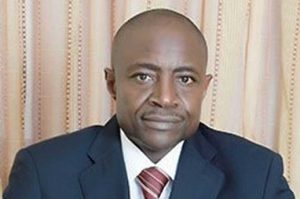Ag. Director-General, National Biotechnology Development Agency (NABDA)
Prof. Alex Akpa is Ag. director-general, National Biotechnology Development Agency (NABDA), – an organisation that has looked inwards to bring out home grown approaches to tackling the Covid-19 pandemic. The agency is one of the leading organisations that have picked the lesson from the raging global health crisis to chart the course of developing indigenous technology.
NABDA has the mandate to carry out well-focused research and development in biotechnology in priority areas of food and agriculture, health, industry, environment and other strategic sectors for national development and draw up programmes and policies for biotechnology utilisation, research and development in Nigeria.
Akpa said the validation has enabled his agency to massively produce test kits, which would in turn enable an increased number of people to be tested for Covid-19 in Nigeria and Africa. He has moved ahead swiftly to fill the gap created by lack of reagents by commencing its production for real time Polymerase Chain Reaction. According to him, lack of reagents had stalled Covid-19 diagnosis in Lagos and Kano.
Conducting molecular testing requires viral information, which comes from extraction of RNA, meaning that without the extraction, no test can be conducted. In other words, what detects the virus is contained in the RNA, which needs to be extracted to be able to detect Covid-19.
The problem of RNA extraction kits had become an issue of serious global concern, as the rising Covid-19 cases worldwide ignited demand for extraction kits. That means a big cut back in export capacity in the producing countries, as they first try to meet surging local needs. The situation put in jeopardy the fate of countries unable to produce extraction kits.
“This project is, therefore, designed to enable not only Nigeria but the whole of Africa to put the issue of shortage of reagents behind,’’ the director-general said. The project is a pan-African endeavour, funded by African Development Bank with Ethiopia, NCDC and the University of Sheffield, UK as partners.
The validated RNA swift test kit for Covid-19 was developed at the University of Sheffield by a Nigerian scientist, Dr. Alison Nwokeoji – who also led the university’s technical support team to Nigeria. Other partners in the project are National Veterinary Research Institute, the Nigerian Institute of Medical Research and the ministries of science and technology, health and agriculture.
NCDC’s evaluation results for the first phase of the project read “awesome and successful’’. The agency’s stamp of approval, conveyed by its chief molecular bioengineer, affirmed that “the kits compete favourably with other international kits we are using; in fact, they scored highly in purity and in quantity of extraction and we are thinking of scaling production’’.

“The attributes of the RNASwift kits make it a game-changer in the design and production of diagnostic kits for infectious diseases in the face of an epidemic or a pandemic,’’ Akpa said.
Akpa observed the risk of poor understanding globally of the challenges posed by Covid-19 pandemic. He actively sought innovative approaches with special emphasis on developing cutting-edge bio techniques in testing for new cases to manage the health crisis.
The risk of casual farm and logistic workers contaminating food products supplied to consumers was considered high. NADBA has therefore specified antibody testing on those who serve as interface between farmers and consumers in order to minimise the risk of contamination of farm produce.
According to Akpa, farm produce such as cabbage, lettuce, carrot, tomatoes, pepper, mangoes and oranges, among others, intended for the general populace are at risk of contamination. If the farm labourers, who harvest the produce, are not tested and certified Covid-19 free, he warns that they could contaminate the vegetables that are moved to the markets and cities.
Scaling up the nation’s testing capability is a critical task that NABDA wants accomplished urgently. The director general has offered the agency’s advanced molecular laboratories in Abuja and Odi, Bayelsa State as testing facilities in order to meet and surpass the presidential target testing of 4,000 people a day.
With the invention, it has become possible to test the targeted five million farmers to ensure that the nation’s food security chain is not compromised by COVID-19.
Akpa has also prescribed antibody testing, especially on the working population to determine the immunity level of the populace. The exercise is expected to generally categorise the population’s vulnerability and specifically delineate the working population into susceptible and resilient sects for reopening of the economy.
People that have inherent level of immunity against COVID-19 are those who could return to work amidst the pandemic to support essential services across all sectors, the director-general said. “This is particularly important considering the fact that such persons will constitute the critical mass in the fight against COVID-19, especially in combat against health workers’ infection’’.
Akpa has also explored another angle of fighting Covid-19 – by harvesting antibodies built by survivors of the disease. He said the antibody could be harvested from blood obtained from a survivor, which could then be multiplied through informatics genetic technology.
NABDA has also offered to assist the Presidential Task Force on COVID-19 and NCDC in the sequencing of local isolates of the SARS-CoV-2, which caused COVID-19. “This service will enable the country to map the sources of the virus strains available in the country.
“It will also help identify likely variations in medical behaviour that will affect response to treatment and vaccine efficiency. “We are also poised to participate in the WHO COVID-19 vaccine testing programme, scheduled to commence soon in Africa,’’ he said.






